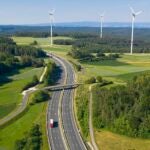- Resources
- Nine major companies take an ‘open-source’ approach to combat climate change
Resources
Nine major companies take an ‘open-source’ approach to combat climate change
Published: July 21, 2020 by Elizabeth Sturcken

The Intergovernmental Panel on Climate Change warns we have just 30 years to reduce emissions to the point where we have no impact on the climate.
The scope of this challenge is daunting — requiring total transformation of our energy, transportation and food systems — as are the human, financial and business risks of climate change. These obstacles are only exacerbated as we continue to suffer from a devastating global pandemic.
In these challenging times, we need bold leadership and immediate action to rebuild a better, more sustainable planet and a low-carbon economy.
The new Transform to Net Zero coalition, which aims to accelerate progress towards a net zero future, is just the kind of leadership we need more of from the private sector.
Here’s why the new business-led initiative has the potential to be truly transformative — and to shift the needle on climate change.
Big name brands are at the table
The Transform to Net Zero coalition is made up of Danone, Maersk, Mercedes Benz, Microsoft, Natura &Co, Nike, Starbucks, Wipro and Unilever — global brands that span industries and together represent over $500 billion in annual revenue.
The coalition was sparked by Environmental Defense Fund (EDF) and Microsoft, and emerged out of a shared sense that even companies like Microsoft, a company often recognized for its sustainability leadership and for its aggressive goal to be Carbon Negative by 2030, don’t know how to reach their ambitious targets.
Working with Business for Social Responsibility, the Transform to Net Zero coalition came together in only six weeks, with a common urgency that all of these leading companies need more clarity about what to do to get to net zero. And if these big name brands can chart the course to net zero, it will be a lot easier for others to follow in their footsteps.
The group will build on current momentum, but fill much needed gaps
There has been an exciting “race to the top” on climate change as of late, even during this global pandemic. In particular, there has been unprecedented momentum in generating corporate climate commitments, thanks to the great work of organizations such as We Mean Business.
Nonetheless, the reality is that only a small handful of companies have a workable plan — or any plan whatsoever — in place to meet their targets. Transform to Net Zero will fill existing gaps by focusing on:
- Moving beyond net zero commitments to the delivery of net zero action.
- Driving cross-sectoral business transformation, rather than industry-specific transformations.
- Producing actionable plans, guidelines and research that can enable all companies to achieve progress towards net zero.
- Engaging in larger change beyond members’ own businesses, including advocacy, financing and investment and innovation.
Members will accelerate action across industries and supply chains
The nine companies involved plan to build the business pathway to net zero and shine a spotlight on how to get there. They will hold up a lantern for other companies and suppliers to fast-follow. And they will focus on the systems change needed for every company and for the planet to get to net zero — policy advocacy, finance and innovation.
Each of these Transform to Net Zero companies already has an aggressive climate goal. But for companies to succeed in achieving their goals — and for the planet itself to achieve a stable climate — business must prioritize actions based on ROI for the climate. They must spread best practices to others. And they must help enact climate policy, such as a price on carbon, that will bring the rest of the world along.
If these nine global brands deliver, together, the results could be transformative.
The coalition includes uncommon bedfellows
The hard work and business change that the Transform to Net Zero Coalition is focused on is the kind of real, on-the-ground change that EDF has been doing with companies for more than 30 years.
That’s why EDF advised members of the Transform to Net Zero initiative in the development of the group’s vision, mission and principles for action, which include being guided by the best available science, a focus on policy and innovation, transparency and accountability, in addition to an emphasis that all climate positive actions should be pursued.
Moving forward, EDF will ensure that we’re bringing our deep science expertise and understanding of market-based principles to inform the development of a roadmap to net zero.
In executing plans to reach net zero, we will work with companies to ensure they’re pursuing all greenhouse gas reduction actions that produce real climate progress. Certain actions should be front and center — and made an urgent priority — for every company: Stopping tropical deforestation on a landscape level; electrifying transportation; increasing clean energy, especially dramatically reducing short-lived climate pollution such as from methane; and engaging in policy advocacy to achieve these priorities. Of course, Transform to Net Zero is only the beginning. The proof will be what we can accomplish together over the next five years.
Follow Elizabeth on Twitter.



